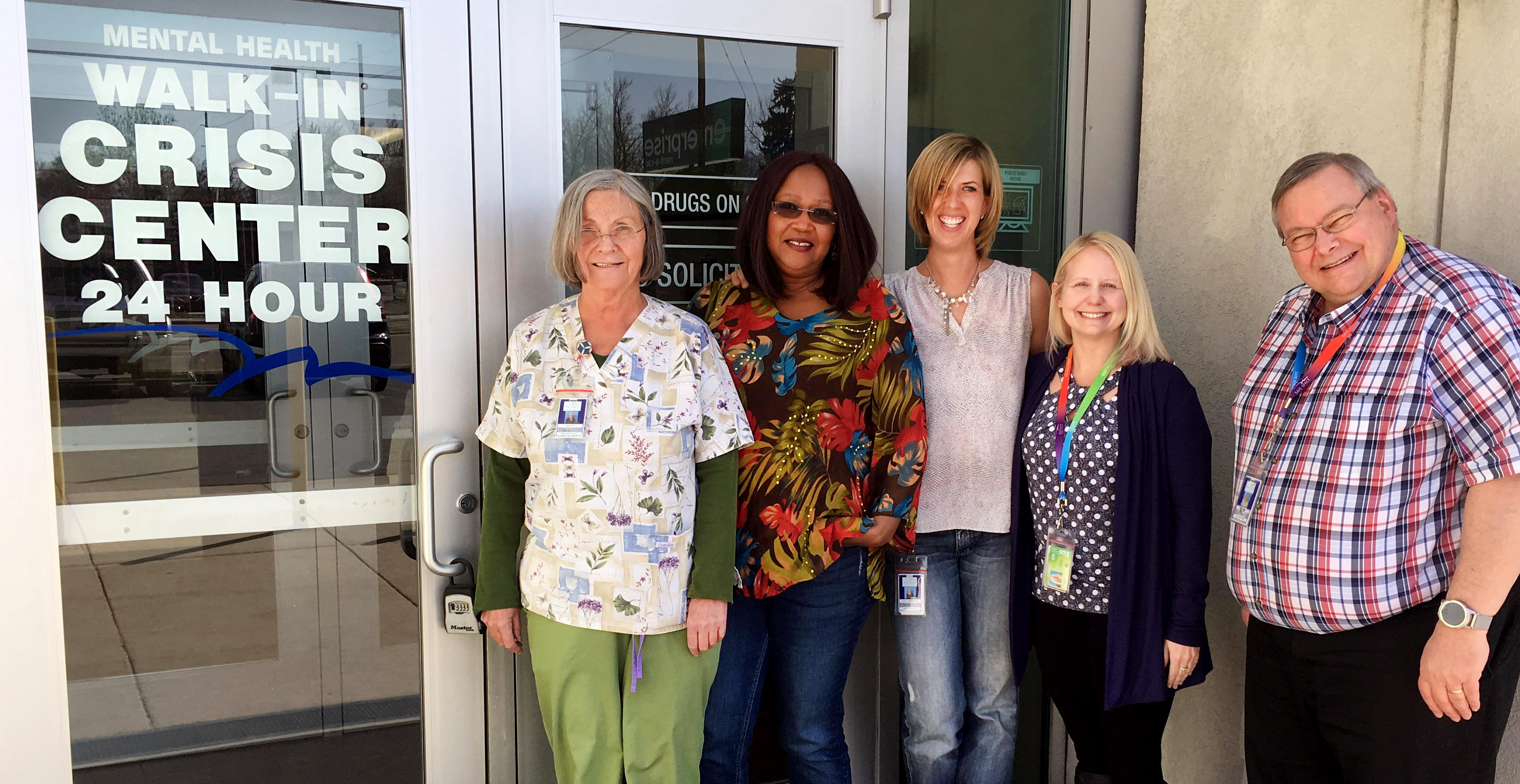Pictured above: Some of the staff at the 24/7 Walk-In Crisis Center who help with the family reunification program. From left to right: Kate Gill, Andrea Bankes, Stacey Hiatt, Marissa VanDover, Eric Meyer.
Sometimes the first step to recovery is a ticket home. It’s an approach our 24/7 Walk-In Crisis Center (WIC) has started using through the new family reunification program.
“The program is really targeting people who are currently homeless but would have a place to stay somewhere else,” said Marissa VanDover, LPC, program manager at the WIC. “We can get someone off the streets or prevent them from becoming homeless in the first place just by purchasing a ticket. We can get them back to their loved ones.”
Helping people get re-connected
Since its start in January, the family reunification program has sent 36 people home to their loved ones. Program participants have taken the bus, plane, or train to destinations across the country, including Oregon, Texas, Florida, and Virginia.
“This isn’t Greyhound therapy,” said Marissa. “This isn’t a ‘What city do you want to go to? We don’t want you in Denver’ kind of thing. We’re also not sending anyone who’s homeless to be homeless in another city, even if that’s where they’re from. This program is about getting people back to where their connections are.”
One young man came to Colorado for a job but was never paid for his work. He immediately became homeless. He stayed in shelters and struggled to find work. When he came to the WIC, they were able to call his grandmother.
“She was so sweet,” said Marissa. On a fixed income, the young man’s grandmother had been saving $15 per month from her Social Security checks, trying to save enough money to get her grandson back. The family reunification program allowed the WIC to purchase the ticket home for her grandson.
“He had a place to live there,” said Marissa. “He had his benefits there. It was a much better life than just being in a shelter here away from family.”
Addressing homelessness in Denver
The Walk-In Crisis Center sees many individuals who come out to Denver only to find themselves homeless and with no way of getting home. This could happen for a variety of reasons.
“There was a mom and daughter who came out to Colorado for their grandmother who was on hospice,” said Marissa. “When the grandmother passed away, they didn’t have a way to get back to their family out of state. The funeral was very expensive, there was no money left, the grandmother’s affairs weren’t in order in the way they thought they were. So they were really stuck.”
There’s a misconception that people become homeless because they didn’t plan well enough. “Sometimes the circumstances are just beyond what a person can control,” said Marissa. “The job market here is tight and the cost of living is high.”
Marissa believes the family reunification program is a cost-effective effort to help someone avoid homelessness.
“If you look at the cost of homelessness for Denver, and then you look at the cost of homelessness on a person’s soul – either way you want to look at it, it’s a huge savings to be able to send the person back to where they have a place to live and back to people who love them,” said Marissa.
Providing a missing piece to recovery
The family reunification program recently helped an individual from St. Louis who had moved to Denver for a job that didn’t work out. In Denver, he had nothing. But in St. Louis, he had family, a place to live, a case manager, and connections to mental health services. Everyone wanted him to come back; his case manager hadn’t even closed him out because she was trying to find a way for him to come back to St. Louis.
“All he needed was to get back to St. Louis,” said Marissa. “His life was essentially all there in one piece, just without him. The missing piece was just the funding for transportation. And we were able to provide that.”
There is a short application process for anyone interested in the program. The process confirms the applicant has a place to stay once they reach their destination and ensures the applicant is safe enough to travel. The WIC also works to connect the applicant with mental health services in their destination city.
Once the application process is complete, the WIC purchases a one-way ticket for the individual. Depending on how quickly they can get ahold of the loved one, the WIC can send someone home as soon as the same day.
“At the WellPower, we say this is where recovery happens,” said Marissa. “And I think this is a big piece of people’s recovery. Being around people who know you and love you, versus being alone, can really help people recover.”
The WellPower operates the 24-hour Walk-In Crisis Center (WIC) in partnership with Colorado Crisis Services. The WIC provides confidential, in-person crisis support, information and referrals to anyone in need.


